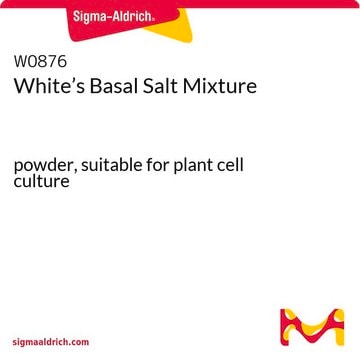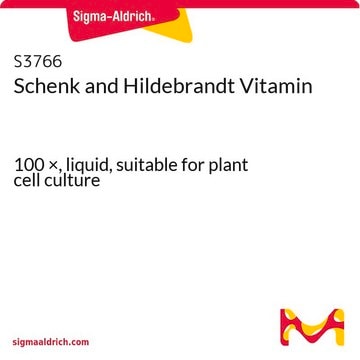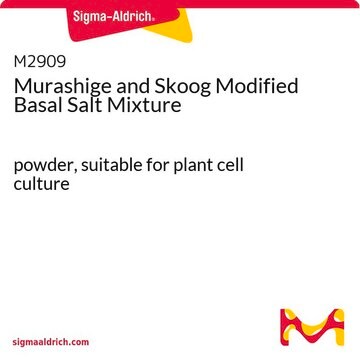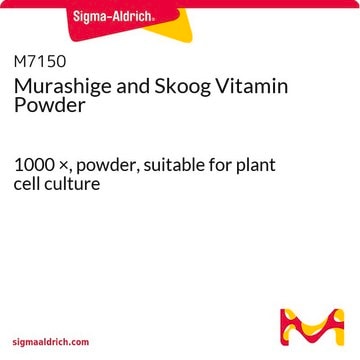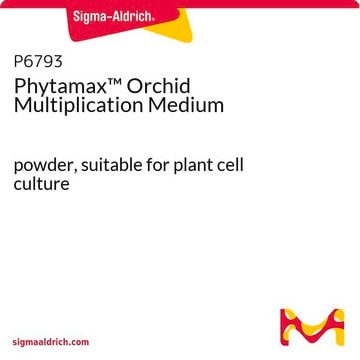C1416
Chu (N6) Basal Salt Mixture
powder, suitable for plant cell culture
Synonym(s):
Nutrient Solution
Sign Into View Organizational & Contract Pricing
All Photos(1)
About This Item
UNSPSC Code:
12352207
NACRES:
NA.72
Recommended Products
form
powder
Quality Level
technique(s)
cell culture | plant: suitable
application(s)
agriculture
storage temp.
2-8°C
Application
Chu (N6) Basal Salt Mixture has been used:
- as medium for Zea mays embryo culture
- as a component of zygotic medium for culturing rice zygotes
- as a medium for onion cells epidermal layer for bombardment based transformation studies
Chu (N6) Basal Salt Mixture is composed of macro- and micronutrients as described by Chu . Chu (N6) Basal Salt Mixture may be used as a chemstock to support the reconstitution of Chu (N6) medium.
Formula variant
Quantity
Formulated to contain 4.0 grams of powder per liter of medium.
Signal Word
Warning
Hazard Statements
Precautionary Statements
Hazard Classifications
Ox. Sol. 3
Storage Class Code
5.1B - Oxidizing hazardous materials
WGK
WGK 1
Flash Point(F)
Not applicable
Flash Point(C)
Not applicable
Personal Protective Equipment
dust mask type N95 (US), Eyeshields, Gloves
Certificates of Analysis (COA)
Search for Certificates of Analysis (COA) by entering the products Lot/Batch Number. Lot and Batch Numbers can be found on a product’s label following the words ‘Lot’ or ‘Batch’.
Already Own This Product?
Find documentation for the products that you have recently purchased in the Document Library.
Customers Also Viewed
Q Zhang et al.
Plant cell reports, 23(9), 587-595 (2005-02-03)
Somatic embryos directly formed at cut edges or on the surface of leaf explants, around cut ends or along side surfaces of petiole and stem explants of 'Golden Pothos' [Epipremnum aureum (Linden & Andre) Bunt.] on Murashige and Skoog (MS)
Electro-fusion of gametes and subsequent culture of zygotes in rice
Toda E, et al.
Bio-protocol, 6, e2074-e2074 (2016)
P Thobunluepop et al.
Pakistan journal of biological sciences : PJBS, 12(15), 1085-1089 (2009-12-01)
Somatic embryogenesis in sweet corn has been reported by a number of workers. However, the knowledge maintaining storage life, vigor and viability of these somatic embryos are limited. A model system of synchronous somatic embryos production combined with encapsulation to
Stefan Knauss et al.
The Journal of biological chemistry, 278(26), 23936-23943 (2003-04-16)
By differential screening of a cDNA library from auxin-induced maize coleoptiles we have isolated and characterized a SAUR gene, designated ZmSAUR2, belonging to a not yet characterized subtype of the SAUR family. ZmSAUR2 encodes a 15.3-kDa protein and is specifically
Hui-ya Ho et al.
Journal of bioscience and bioengineering, 110(5), 588-592 (2010-07-27)
Loquat (Eriobotrya japonica Lindl) is a traditional Chinese medicinal plant that contains triterpenes, which have been shown to exhibit pharmaceutical activities. In this study, we investigated various different culture conditions for cultured cells of loquat to produce triterpenes, including illumination
Our team of scientists has experience in all areas of research including Life Science, Material Science, Chemical Synthesis, Chromatography, Analytical and many others.
Contact Technical Service




